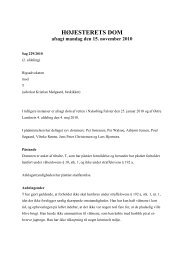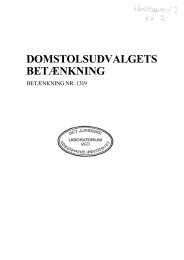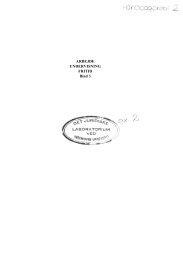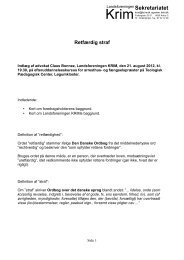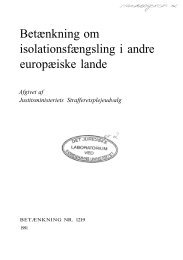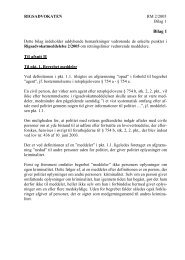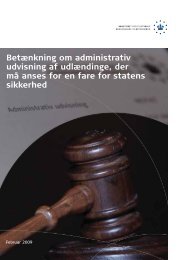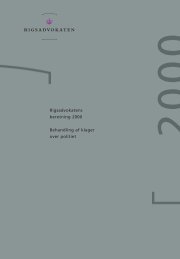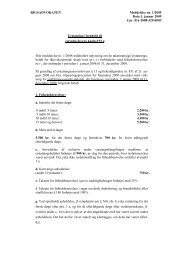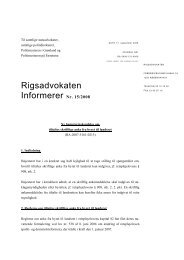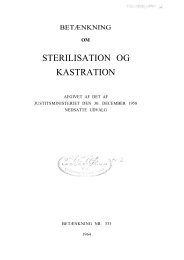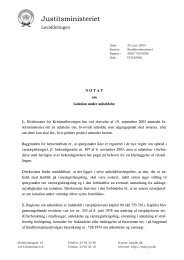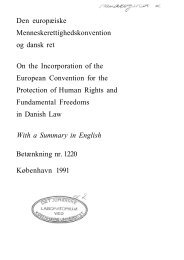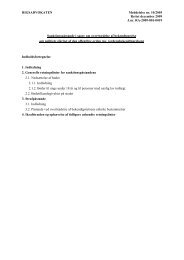Betænkning 601 om privatlivets fred - straffelovsrådet 1971 - Krim
Betænkning 601 om privatlivets fred - straffelovsrådet 1971 - Krim
Betænkning 601 om privatlivets fred - straffelovsrådet 1971 - Krim
Create successful ePaper yourself
Turn your PDF publications into a flip-book with our unique Google optimized e-Paper software.
Photography Act, it being deemed more expedient<br />
to regulate photographing in connection<br />
with other questions relating to the<br />
right of peace and privacy.<br />
In addition to the special legal provisions,<br />
a general unwritten rule on the protection<br />
of the right of privacy and the integrity of<br />
personality is assumed to apply in Danish<br />
law. This matter is the subject of Chapter<br />
IV. It is stressed that the shortc<strong>om</strong>ing of the<br />
system in force is the slender possibilities of<br />
reaction that exist in cases where the courts<br />
characterise a particular act as unlawful on<br />
the basis of the general principle of law. It<br />
is possible to prevent the act fr<strong>om</strong> being<br />
continued; however, where the violation has<br />
already taken place, the injured person has<br />
typically no chance of obtaining c<strong>om</strong>pensatory<br />
damages. That Chapter shall be<br />
viewed in connection with Chapter IX, rec<strong>om</strong>mending<br />
a general rule of protection in<br />
the form of c<strong>om</strong>pensatory damages to the<br />
injured person.<br />
Chapter VII examines and estimates the<br />
rules governing the ethics of journalism.<br />
The Criminal Law Council points out the<br />
considerable advantages afforded by protection<br />
of the right of privacy through ethical<br />
rules of journalism, as c<strong>om</strong>pared with a<br />
legal regulation. On the other hand, it should<br />
be recognised that the Danish system of<br />
press ethics, in its present form, is subject to<br />
a number of specified defects, which tend to<br />
diminish its importance. It is held that a<br />
development of the system of press ethics<br />
would reduce the need for applying the general<br />
legal provisions in relation to the press.<br />
The proposal of the Criminal Law Council<br />
concerning the future rules of protection<br />
are found in Chapters VIII and IX.<br />
Chapter VIII deals with the penal aspects<br />
of the problem. In view, i.a., of the requirements<br />
that must be made in regard to a<br />
precise wording of penal clauses, it has not<br />
been considered feasible to draw up a more<br />
general principle on the protection of the<br />
right of privacy sanctioned through punishment;<br />
the penal legislation in this field must<br />
continue to take the form of a number of<br />
provisions delimiting the punishable behaviour<br />
in relation to the individual possibilities<br />
of violation.<br />
By reason of the wide lawful applications<br />
of c<strong>om</strong>ponents forming part of the so-called<br />
spy-equipment, the Criminal Law Council<br />
does not find a general prohibition of such<br />
equipment practicable; the penal clauses<br />
should be directed against the unauthorised<br />
use of such devices and the utilisation of data<br />
provided in that way, and not against the<br />
importation, production or sale of the devices.<br />
Aside fr<strong>om</strong> the updating of the penal provisions<br />
already in force with a view to clarifying<br />
their scope and fr<strong>om</strong> the increase of<br />
the ranges of penalties, etc., the Criminal<br />
Law Council rec<strong>om</strong>mends the enaction of<br />
new penal provisions protecting against<br />
tapping and spying (photographing) and<br />
against the utilisation by others of the data<br />
resulting fr<strong>om</strong> the unlawful activity. .<br />
The main points of the proposed new<br />
penal provisions are:<br />
(1) the proposal of a new penal provision<br />
on the tapping or recording of a conversation<br />
between others by means of a<br />
hidden device;<br />
(2) the proposal of a new penal provision<br />
on photographing, without their permission,<br />
of persons being in an area to<br />
which there is no free access, and on<br />
the spying on such persons by means of<br />
field-glasses or the like;<br />
(3) the proposal of a penal provision concerning<br />
the passing on of data and pictures<br />
that goes further than the rules in<br />
force, notably by including the passing<br />
on of pictures of another person in<br />
circumstances which he can obviously<br />
expect not to be disclosed publicly. The<br />
provision is so drawn up as to protect<br />
also against offensive particulars and<br />
pictures relating to deceased persons;<br />
(4) the proposal of extending the penal provisions<br />
so as to include also any person<br />
who, without being a party to the<br />
91



